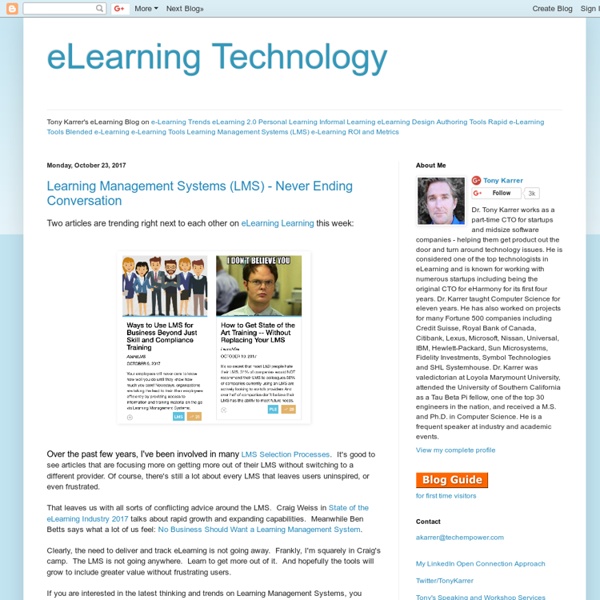



http://elearningtech.blogspot.com/
Swansea Metropolitan University Education Research The University’s research covers engineering, social science, arts and humanities disciplines. Striving to be engaged, always innovative, it’s often interdisciplinary and collaborative in nature. Through our research partnerships we influence economic, cultural and social landscapes at national, European and international levels by delivering benefits for business, government and communities. Classics Find out more Research in the areas of classical literature; Rome and the West; Economy and Materiality; and the Ancient Near East. Art and Design Find out more Research in applied art and design; design policy; film, photography and digital media; fine art and performance. Celtic Languages Find out more Research in applied linguistics, sociolinguistics and dialectology; medieval Welsh religious history, medieval Welsh literature; Welsh folk life and folk culture.
The MOOC Guide The purpose of this document is two-fold: - to offer an online history of the development of the Massive Open Online Course (MOOC) - to use that history to describe major elements of a MOOC Each chapter of this guide looks at one of the first MOOCs and some early influences. It contains these parts: - a description of the MOOC, what it did, and what was learned - a description of the element of MOOC theory learned in the offering of the course - practical tools that can be used to develop that aspect of a MOOC - practical tips on how to be successful
10 Edtech Podcasts That You Will Love As an educational professional, the best way to learn about new learning experiences is to hear about them firsthand from other educators. While this can be a challenge for some busy professionals, podcasts provide a convenient, approachable way for educators to learn about the latest in education technology. While websites such as Spotify and iTunes host booming marketplaces for purchasing these podcasts, sifting through the best can be a challenge. Luckily, we’ve rounded up some suggestions of the best podcasts for you to put on the top of your To Do list. TEDTalks Education– TEDTalks have long been recognized as a popular source of information for all types of audiences. These talks feature well-known presenters as well as newcomers.
Faculty of Education, University of Cambridge Contact Sara Hennessy University of Cambridge Faculty of Education 184 Hills Road, Cambridge, CB2 8PQ Tel: 01223 767657E-mail: sch30@cam.ac.uk Publications Wilfred Rubens: technology enhanced learning Impacts of ICT in education. The role of the teacher and teacher training Impacts of ICT in education. The role of the teacher and teacher training. A.K. Jager and A.H. LokmanStoas Research, Wageningen, The Netherlands
9 Step Guide for Administrators New to Twitter (From an administrator relatively new to Twitter) « Mission Driven Leadership BOLD STATEMENT ALERT…Every school administrator, and really every educator, needs to be on Twitter. This is not a statement I realized to be true until I was actually active on Twitter, but now I regret waiting so long. There are several Twitter startup guides out there, but this one is unique (I hope) as it focuses on administrators and educational leaders new to Twitter, from the perspective of an administrator fairly new to Twitter. There are so many reasons to be on Twitter; self-reflection, professional development, current data and research, collaboration, and modeling tech savviness to staff and students. But how does one get started? Internet TESL Journal (For ESL/EFL Teachers)
Box of Tricks - Technology and Education Integrating ICT into the MFL classroom: SchoolRack » Create a FREE Teacher Website or Educational Blog!